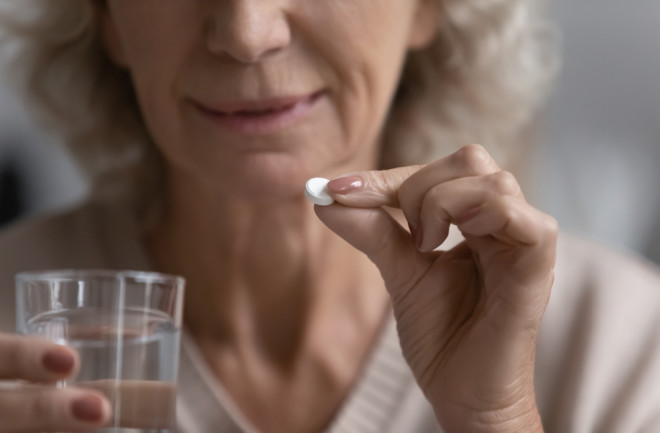Do you actually know which ingredients are in dietary supplements? Studies show that everything from bacteria and drugs, both prescription and unapproved, to heavy metals like lead can be found in supplements. Some products, like CBD, suffer from “underdosing,” in which the active ingredient measured in the supplement is less than what the label claims.
Makers of supplements do not have to submit their product for approval or for quality control, and regulators that hamstring the Federal Drug Administration (FDA), along with the conduct of companies that produce products, “combine together to create something that's very akin to the wild west,” says Charles White, professor and chair of pharmacy practice at the University of Connecticut.
Until recently, researchers have only been able to test these supplements without any other group to compare to. But now that recent studies show that supplements of the plant-derived galantamine contain sometimes as little as 2 percent of the dose that the product claims, and may even contain bacterial contamination, experts are questioning regulation on dietary supplements.
What Is in Galantamine Supplements?
Galantamine provides a unique testing ground since it is available both as a drug and as a supplement. The FDA has approved galantamine for treatment of mild to moderate Alzheimer’s disease and it is also sold as a supplement, where companies say it supports “lucid dreaming and cognition.”
This gave researchers the opportunity to test the quality of galantamine since it’s marketed under two different regulatory frameworks head-to-head, says Pieter Cohen, a physician at Cambridge Health Alliance and lead author of the study.
For the study, published in JAMA, researchers bought 10 different supplement products from Amazon and 11 generic prescription drugs of galantamine from the Cambridge Health Alliance hospital pharmacy. Because they go through quality control and an approval process, the prescription drugs served as a sort of control group, says Peter Lurie, executive director of the Center for Science in the Public Interest and former associate commissioner for Public Health Strategy and Analysis at the FDA.
When researchers analyzed how much galantamine was in each drug or supplement, 9 out of the 10 brands of supplements had an inaccurate amount, much lower than advertised on the label. One product had a mere 2 percent of the 6mg of galantamine it claimed to have.
“The dosages were all out of whack,” says Cohen. Meanwhile, the prescription drugs were all between 97 percent and 104 percent of what was advertised.
Read More: Dietary Supplements and Protein Powders Fall Under a ‘Wild West’ of Product Regulation
How Bacteria was Found in Galantamine
The researchers also looked for the presence of bacteria and found that three out of 10 brands of supplements had bacteria contamination, while none of the prescription drugs had any contamination. This proved that it was therefore possible to make the product accurately.
Someone most likely wouldn’t get sick from the bacteria found in the supplements, as well as the low levels present. But the bacteria raise concern on the manufacturing and storing of supplements, particularly whether it’s produced in unsterile conditions.
The findings mainly show the poor quality of other dietary supplements. “It’s a terrible market,” says Lurie. “The products are inferior by any reasonable yardstick.”
This might be due to a faulty regulatory pathway. The FDA itself also needs to do a better job identifying and following up with these issues, Cohen says.
Read More: Strange Side Effects From Supplements and What You Need to Know
The Supplement Market and Safety
Since these supplements are on the market and individuals are taking them, there can be serious consequences, says Lurie. About 23,000 emergency room visits annually are linked to use of dietary supplements.
There may also be more subtle consequences that are not reflected in hospitalizations. The combination of little active ingredients and false claims can lead patients down a path where they fail to receive appropriate treatment for their conditions. Specifically, for galantamine, that may mean patients could be taking supplements that lack the dose necessary to treat Alzheimer’s.
“That would be really sad,” says White.
Bills like the Dietary Supplement Listing Act of 2022, which calls for a database of all of supplements with their ingredients, have been introduced to increase transparency and help solve this problem. Companies themselves can also get their products certified by third-party companies.
Consumers don’t see this lack of quality in other industries, White points out. “If you want to buy a Tesla and somebody sells you a Kia, how is that ok?” he questions. “People are going to have to have louder voices.”
Read More: They May Taste Good but are Gummy Vitamins Effective?
This article is not offering medical advice and should be used for informational purposes only.
Article Sources:
Our writers at Discovermagazine.com use peer-reviewed studies and high-quality sources for our articles, and our editors review for scientific accuracy and editorial standards. Review the sources used below for this article:
Clinical Pharmacology. Continued Risk of Dietary Supplements Adulterated With Approved and Unapproved Drugs: Assessment of the US Food and Drug Administration's Tainted Supplements Database 2007 Through 2021
Annals of Pharmacotherapy. Lead in Mineral or Multivitamin-Multimineral Products
JAMA Netw Open. Unapproved Pharmaceutical Ingredients Included in Dietary Supplements Associated With US Food and Drug Administration Warnings
The New England journal of medicine. Emergency Department Visits for Adverse Events Related to Dietary Supplements
Congress.gov. Dietary Supplement Listing Act of 2022

